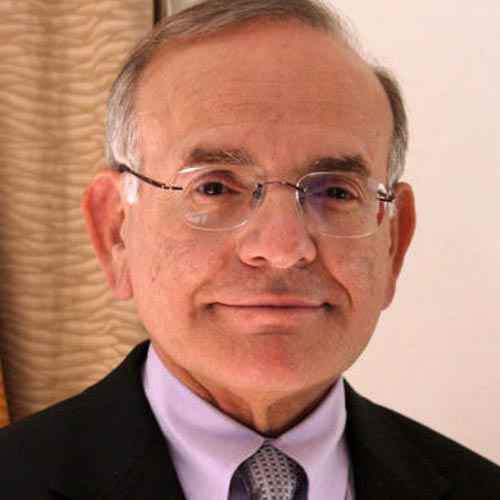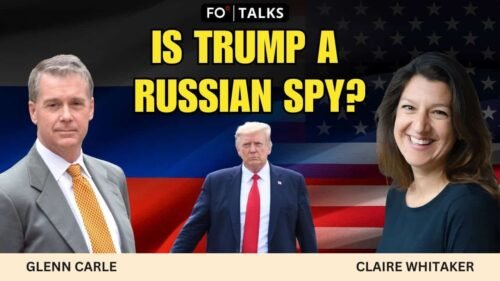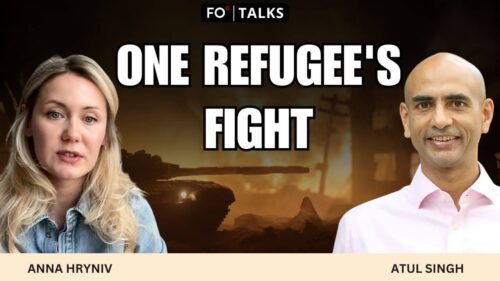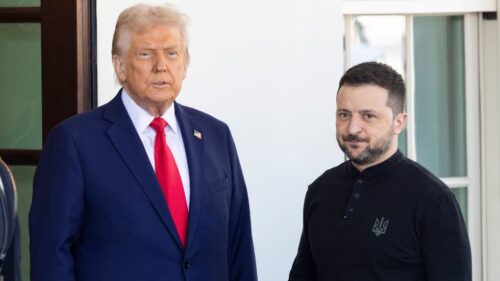Fair Observer Founder, CEO & Editor-in-Chief Atul Singh hosts a live chat with retired US Ambassador Gary Grappo and retired CIA Officer Glenn Carle. They dissect US President Donald Trump’s two summits of uncertainty. The conversation moves through three themes: the summit in Anchorage, Alaska, with Russian President Vladimir Putin; the follow-up summit in Washington, DC; and the broader implications for Ukraine, Europe and global security.
The Anchorage summit: a triumph for Putin
Glenn opens with a stark assessment of Trump’s relationship with Russia. He calls it “bizarre” and suggests that Trump is, at the very least, manipulated by Russian intelligence. He argues that Trump often echoes Russian foreign policy talking points verbatim, making him one of the easiest political figures for Moscow to influence. For Glenn, the Anchorage summit is nothing less than a symbolic and practical victory for Putin. By meeting with the world’s leading sanctioning power, Putin breaks out of the containment imposed since the Ukraine invasion.
Glenn dismisses Trump’s pre-summit tough rhetoric as little more than tactical posturing, perhaps designed to create leverage or even burnish his credentials for a Nobel Prize. From Glenn’s perspective, the meeting yields nothing for Washington while granting Russia international legitimacy. He concludes that Trump achieves his personal goal — being the center of attention and restoring Putin’s prominence — while Europe is sidelined and Ukraine left in a vulnerable position.
Gary echoes this view, calling Trump’s treatment of Putin “bizarre, uncanny and solicitous,” almost as if Trump is a subordinate. He highlights Putin’s deliberate tactic of keeping the US president waiting — a classic power play in diplomacy designed to show dominance. For Gary, Trump’s behavior upon greeting Putin is shocking for a US president and signals weakness rather than resolve.
Gary goes further by analyzing Putin’s body language, which he interprets as a display of dominance shaped by the Russian leader’s background in judo. Putin’s habit of speaking at length, he argues, is a strategic move to frame his vision as the superior approach. Trump seems to accept this by abandoning demands for a ceasefire.
Instead, Trump moves toward Putin’s preferred path of a swift “peace plan.” Gary warns that genuine peace agreements are complex and time-consuming, and Trump’s negotiating team lacks the experience to manage such intricacies. In his view, Trump essentially concedes on the ceasefire while Putin flatters Trump with dubious claims, such as saying Trump won the 2020 election and that Russia would not have invaded Ukraine under his presidency. Gary dismisses these as manipulative falsehoods.
A Russian journalist describes the event as a “total victory for Russia and for Putin.” Both Gary and Glenn find this judgment accurate. Glenn reiterates that Trump has no coherent strategy, only the desire to appear successful in the moment. Trump’s foreign policy, he argues, is not guided by principles or philosophy but by self-interest and personal image.
Atul sums up the consensus: The United States gains nothing, Putin emerges as a clear winner and Trump, in his own mind, wins by being the center of attention.
The Washington summit: damage control or crisis?
The Washington follow-up summit was meant to address the fallout from Anchorage, but brought mixed results. Gary notes that Trump’s call with Ukrainian President Volodymyr Zelenskyy prompts the latter to seek a meeting in Washington. This is significant, given Zelenskyy’s bruising experience in February when US Vice President JD Vance publicly told him to capitulate, straining US–Ukraine relations.
Gary believes the presence of European leaders at the Washington summit helped prevent a repeat of that debacle. Trump’s talk of territorial concessions, however, unsettled Zelenskyy and European allies, raising fears of a US pivot toward Russian terms. While some US officials floated the possibility of peacekeeping missions, Gary warns such assurances could vanish quickly if not endorsed directly by Trump.
Atul asks whether the Washington summit amounts to damage control. Gary agrees, though he doubts that is the official intention. Glenn, in typically blunt terms, describes the event as moving from “the jaws of a definitive catastrophe” — namely the collapse of Ukraine, NATO’s unraveling and Russia’s absorption of Central Europe — to a severe crisis. He likens this to shifting from certain death to “fourth-stage cancer.” His advice to Europe is clear: Stay close to the US but prepare to defend yourselves independently. Europe, he argues, has shown more capability and resilience than expected, but reliance on Trump’s America is risky.
Style, strategy and strain: reactions to Zelenskyy and Europe
At this point, Atul introduces three journalistic observations:
Zelenskyy’s appearance: Some European journalists criticize his all-black attire and angled chair as brash. Glenn dismisses such concerns, praising Zelenskyy for presenting himself as a wartime leader rather than a supplicant.
European leaders’ weakness: Most, apart from Italy’s Giorgia Meloni, face domestic political fragility due to economic hardship and low approval ratings. Glenn attributes these vulnerabilities to broader social strains such as modernization and immigration, but insists their support for Ukraine is rational and necessary. Gary acknowledges the fragility but emphasizes that the public understands the importance of standing behind Ukraine and NATO.
Zelenskyy as a “dead man walking:” Some commentators suggest his thin-skinned behavior, corruption scandals and dwindling US support undermine his leadership. Glenn admits he is starting to see troubling signs, citing polls showing Ukrainians’ desire for peace. Gary, however, strongly rejects such polls as misleading. He stresses that large majorities of Ukrainians oppose territorial concessions, comparing pro-peace responses to vague platitudes like “motherhood and apple pie.”
The two experts diverge on polling but agree that European unity on defending Ukraine remains strong. Leaders may overstate praise for Trump to keep him engaged, but Gary worries about the lack of substantive detail in Washington. Both warn that Trump’s negotiating team lacks the expertise for serious diplomacy.
Patterns of aggression and fragile diplomacy
Glenn broadens the lens, pointing to Russia’s record of unchecked aggressions — in Montenegro, Nagorno-Karabakh, Georgia, Moldova, Estonia, Crimea and Ukraine. He argues that the West has consistently ignored these actions, responding only with vague calls for peace. For him, Trump represents a continuation of this failure, offering little interest in complex policy and even less capacity for nuanced statecraft.
Gary, only “microscopically” more optimistic after Washington than Anchorage, hopes Zelenskyy and European leaders can persuade Trump of Ukraine’s security importance. He underscores the brutality of Putin’s policy, particularly the kidnapping of thousands of Ukrainian children, who are placed in Russian families — a tactic with long-term consequences.
Looking ahead: pressure, politics and possibilities
The final portion of the discussion looks ahead. Atul raises two questions: the influence of domestic pressures in Europe, particularly among Muslim populations who see Western support for Ukraine as biased compared to Gaza, and the Republican narrative in Washington portraying Europe as weak and dependent.
Gary believes Trump remains fixated on staging a trilateral summit with Putin and Zelenskyy, though he doubts Putin’s willingness to participate. Without major US financial commitments — perhaps $50–80 billion — Russia has little incentive to engage. NATO’s future, he warns, is tied directly to the Ukraine question. Keeping Trump involved, possibly with the prospect of a Nobel Prize, might help, but Gary doubts Trump will take substantive steps.
Glenn, however, sees a potential path forward. He notes that the US could provide arms to NATO countries, which could then transfer them to Ukraine, allowing Trump to maintain his pro-Putin image without entirely abandoning Kyiv. This arrangement, he argues, might be the most plausible near-term strategy. Ultimately, he lays out two possible outcomes: Either Ukraine collapses or it is sustained by European and American support until Putin is forced to halt or accept defeat.
The future hangs in the balance
The discussion paints a sobering picture of Trump’s foreign policy approach. For Glenn, Trump is a leader driven solely by self-image, easily manipulated yet impossible to control. For Gary, Trump’s diplomatic style is reckless and devoid of substance, leaving NATO allies anxious and Ukraine imperiled. Both agree that Putin emerges strengthened from Anchorage and that Washington offers only a slight reprieve from disaster.
In their eyes, the uncertainty of Trump’s summits reflects a deeper crisis in transatlantic relations, where Europe must prepare to defend itself while still relying on an unpredictable US. The stakes, they conclude, are nothing less than Ukraine’s survival and NATO’s future.
[Lee Thompson-Kolar edited this piece.]
The views expressed in this article/video are the author’s own and do not necessarily reflect Fair Observer’s editorial policy.













































Comment